Maureen Duffy (original) (raw)
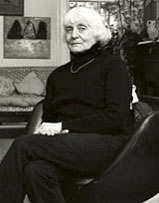 Summer Comes to the Urban Garden
Summer Comes to the Urban Garden
The rambler is putting on white for June
the marrying month, and for the pink New Dawn
climbing a neighbour's fence, while
the blackbird aloft on an ariel
lets fall his aria into the smoky air
and wild campanula has colonised
the crannies between wall and pavement
along the street with its little blue stars
outdoing coltsfoot, dandelion, shepherds' purse.
In the gusty wind the tall plane tree
tosses its head against the telephone wires.
Dandy in rose shirt front, grey jacket white collar,
the wood pigeon begs Betty to mind his sore foot
while his feral cousins burble
in the gutter. Campanula
pitches her seeds past tamed window box
geraniums into backyards
to sprawl at the feet of clematis
fucsia, hydrangea, winding them
in its long green tresses.
Copyright Maureen Duffy 24 May 2020
Arriva l’estate al Giardino Urbano
Maureen Duffy
Traduzione di Anna Maria Robustelli
La rosa rampicante si sta vestendo di bianco per giugno
il mese degli sposi, e per la New Dawn rosa
che si arrampica sul recinto di un vicino, mentre
il merlo in alto su un’antenna
rilascia il suo verso nell’aria fumosa
e la campanula selvatica ha colonizzato
le crepe tra il muro e il marciapiede
sulla strada con le sue piccole stelle azzurre
che superano la farfara, il tarassaco e la borsa di pastore.
Nel vento impetuoso il grande platano
scuote la testa contro i fili del telefono.
Dandy con il petto della camicia rosa, colletto bianco in giacca grigia,
il colombaccio implora Betty di badare al suo piede dolorante
mentre i suoi cugini inselvatichiti gorgogliano
nella grondaia. La campanula
getta i suoi semi al di là del vaso di gerani
domestici nei cortili
perché si spandano ai piedi della clematide
fucsia, dell’ortensia, cingendole
con la sua lunga capigliatura verde.
Copyright Anna Maria Robustelli 22 June 2020
In Time of Plague
We are the virus corvine 2020,
Spread over the face of the earth,
Silencing the cities, hushing town and village,
Colonising space and time as if
The planet wasn’t enough for our millions
To despoil, denude of leaf and butterfly wing
Until we can no longer look each other in the eye,
Take another in our arms, all bound together
By a lonely death, locked down in our dens by fear
In a half life no longer hardly worth enduring,
And even time has contracted to our prison walls
Let out once a day like a dog on a leash
Freed shortly to walk under the sky,
Then in again to solitude. I think of those nuns
Immured by choice and how they were allowed
‘to make pleasing gestures through a window slot’.
We have no such freedom, can’t refuse our prison,
Shut up in this night like chickens caged safe
From our fox who’s a many headed hydra
With sharp claws to pull us down for all
Our squawks, and attempts at flight, until
We suck it in to colonise our spongy lungs
Giving it safe harbour while it gobbles us up.
Copyright Maureen Duffy 26 March 2020
Nel tempo della pandemia
Maureen Duffy
Traduzione di Anna Maria Robustelli
Sono il virus corvine 2020,
diffuso sulla faccia della terra,
che silenzia le città, mette a tacere città e campagna,
colonizza lo spazio e il tempo come se
non bastasse che il pianeta fosse depredato da milioni
di persone, spogliato di foglie e di ali di farfalle
al punto che non possiamo più guardarci negli occhi,
prendere qualcuno tra le braccia, tutti tenuti assieme
da una morte solitaria, rinchiusi nelle nostre tane per la paura
in una vita a metà che non vale più la pena di essere a stento sopportata,
e anche il tempo si è ridotto alle pareti delle nostre prigioni
lasciati uscire una volta al giorno come un cane al guinzaglio
liberi per poco di camminare sotto il cielo,
poi dentro di nuovo in solitudine. Penso a quelle suore
murate per scelta e a come era loro permesso
di fare gesti di piacere attraverso la fessura di una finestra.
Noi non abbiamo quella libertà, non possiamo rifiutare la nostra prigione,
serrati in questa notte come polli ingabbiati al sicuro
dalla nostra volpe che è un’idra dalle molte teste
con artigli affilati per buttarci giù nonostante tutte
le nostre strida e i tentativi di fuga, finché
lo risucchiamo per fargli colonizzare i nostri polmoni spugnosi
dandogli un porto sicuro mentre ci divora.
Copyright Anna Maria Robustelli 24 April 2020
Maureen Duffy (b. 1933 in Worthing, Sussex) is a notable contemporary British poet, playwright and novelist. She has also published a literary biography of Aphra Behn, and The Erotic World of Faery a book-length study of eroticism in faery fantasy literature.
After a tough childhood, Duffy took her degree in English from King’s College London. She went on to be a schoolteacher from 1956 to 1961, and edited three editions of a poetry magazine called the sixties. She then turned to writing full-time as a poet and playwright after being commissioned to produce a screenplay by Granada Television. Her first novel, written at the suggestion of a publisher, That’s How It Was (1962), was published to great acclaim. Her first openly lesbian novel was The Microcosm (1966), set in the famous lesbian Gateways club in London.
Maureen is the author of 34 published works of fiction, including 9 collections of poetry, non-fiction, and 16 plays for stage, screen and radio, the most recent, being Sappho Singing; she is a fellow of the Royal Society of Literature and of King’s College London, and a Vice President of the Royal Society of Literature, as well as President of Honour of the British Copyright Council and the ALCS, and a CISAC gold medallist. She was recently awarded a D. Litt by Loughborough University for contributions to literature and equality law reform. Life Writing is included in her new collection, Environmental Studies, to be published by Enitharmon in April 2013.
Her novel Gor Saga was televised in 1988 in a three part mini-series called First Born starring Charles Dance.
She is said to have been Britain’s first lesbian to ‘come out’ in public, and made public comments during the debates around homosexual law reform. In 1977 she published The Ballad of the Blasphemy Trial, a broadside against the trial of the Gay News newspaper for ‘blasphemous libel’.
Wanderer
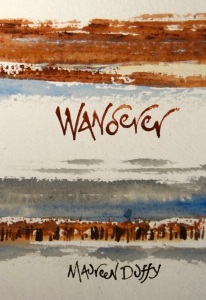
A new collection of poetry by ‘one of Britain’s foremost writers’ (Guardian), and ‘a unique literary talent’ (Sarah Walters) forms the The Pottery Press's fifth pamphlet. We travel with the poet on the Wanderer’s terrifying voyage, on exploratory passages to India and Ravenna, on a very English train-ride, to concerts and galleries (and on the journeys of imagination they stimulate), through the gardens and street-markets of London, and to the junkshop of the remembered past. Maureen Duffy describes one of these poems as ‘a kind of elegy to life and love’, the ultimate theme of this brave and passionate collection.
‘Tough poems, made of the rough substance of real lives… a beautiful answering back against the worst.’ (David Constantine)
'so different from much other stuff written on the same subject, it takes up the perspective of the refugees, the homeless...Liz Mathews's design is powerful, here as elsewhere...it reads as if it were recorded with a hand-held linguistic camera...What a declaration of love -- love of life! Too good to be true.' (Christoph Bode, Prof emeritus LMU Munich)
For more information please see Journeys of imagination
Wanderer
New poems by Maureen Duffy
48 pages with 31 full-colour images by lettering artist Liz Mathews
ISBN 978-0-9930171-5-5
Published London 2020
£9.99 from The Pottery Press and selected bookshops
contact potterypress(at)pottersyard.co.uk
Past Present: Piers Plowless & Sir Orfeo
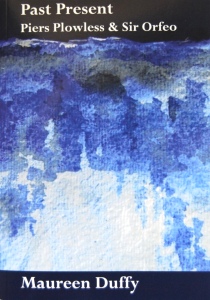 Past Present: Piers Plowless & Sir Orfeo is the first Pottery Press Pamphlet, with two exciting long poems by Maureen Duffy. The New Vision of Piers Plowless is Duffy’s contemporary riff on the medieval poem The Vision of Piers Plowman by William Langland, which combines social protest and satire with allegory about the pilgrimage of the soul, and a vision of England transformed. In her Forward, Frances Bingham calls the poem ‘a magnificent rant, addressed to fellow-author Will Langland who wrote his protest song for everyman Piers and ‘the fair field of folk’ so many centuries ago.’ And the introduction continues:
Past Present: Piers Plowless & Sir Orfeo is the first Pottery Press Pamphlet, with two exciting long poems by Maureen Duffy. The New Vision of Piers Plowless is Duffy’s contemporary riff on the medieval poem The Vision of Piers Plowman by William Langland, which combines social protest and satire with allegory about the pilgrimage of the soul, and a vision of England transformed. In her Forward, Frances Bingham calls the poem ‘a magnificent rant, addressed to fellow-author Will Langland who wrote his protest song for everyman Piers and ‘the fair field of folk’ so many centuries ago.’ And the introduction continues:
‘Her protest against a so-called austerity which causes suffering to the poorest in society while sparing the richest, and tries to silence the arts and deplete learning and libraries, has never been more relevant. But crucially, like her medieval model, there’s robust humour here too – and a breath of hope; a call to arms.’
Sir Orfeo, the companion poem in this volume, is Maureen Duffy’s translation of another medieval poem, with migrates the Orpheus myth to the England of a folktale, and gives it a happy ending; the classical Underworld becomes Elfland under a green hill, the Arcadian landscape an English orchard.
The coupling of the two poems in this book makes a weird and powerful statement about England on the edge; a land with an imagined mythic past, a millennial present and perhaps apocalyptic future.
'Maureen Duffy has inspired many other writers and proved that the English novel… can be fantastical, experimental and political. Perhaps it is her poetry, though, that most fully captures her range as she presses on like a medieval troubadour across barriers of genre, gender, space and time.' TLS
The book also has lettered title pages and 9 full-page colour images by Liz Mathews, a Forward by Frances Bingham and an introduction by Maureen Duffy. For more information please see Past Present at The Pottery Press.
Past Present: Piers Plowless & Sir Orfeo
Poems by Maureen Duffy; images by Liz Mathews
46 pages 9 full-colour images 2 lettered title pages
ISBN 978-0-9930171-1-7
Published London 2017
£6.99 from The Pottery Press and selected bookshops
contact potterypress(at)pottersyard.co.uk
Pictures from an Exhibition
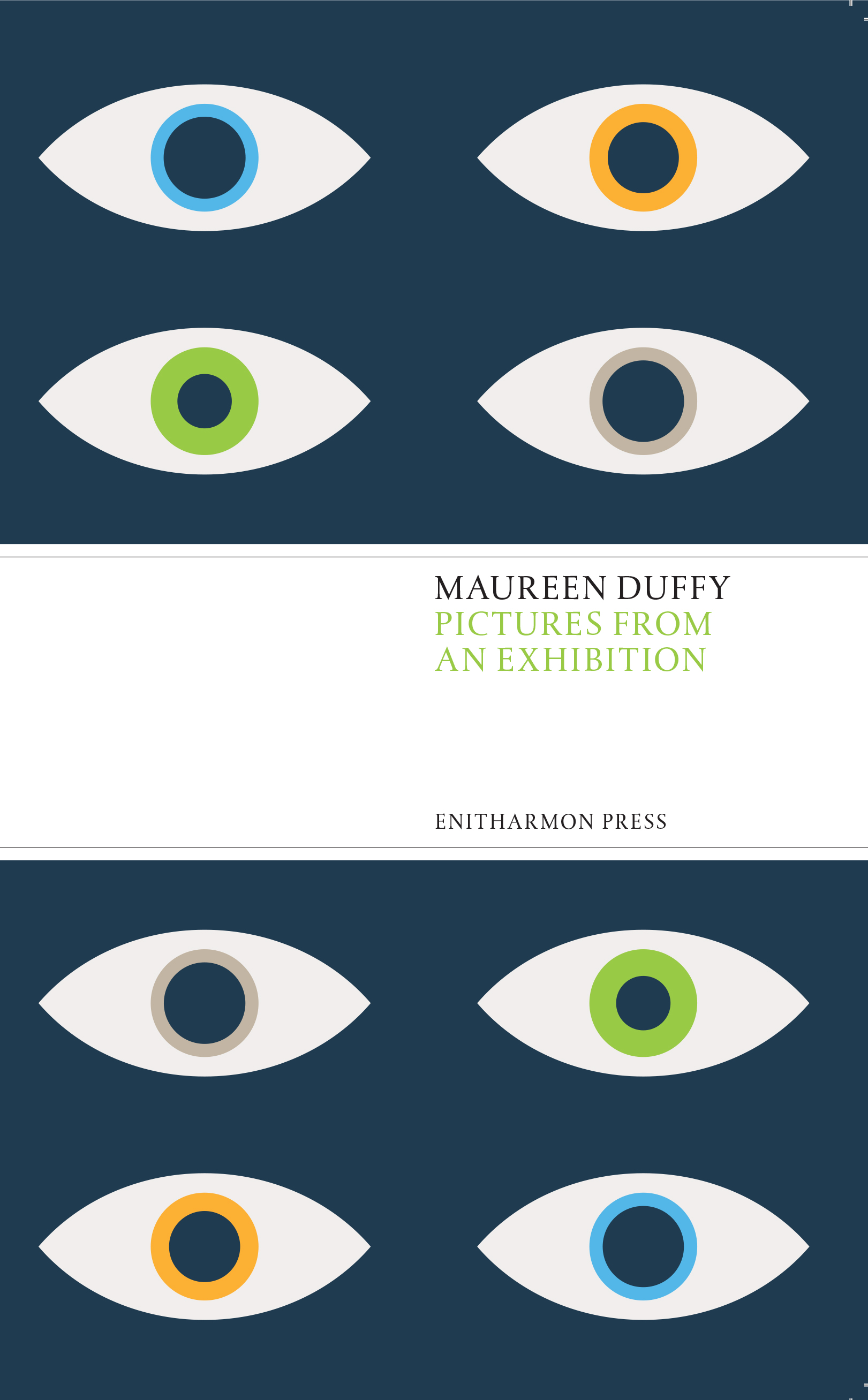
Maureen's eighth collection of poetry, Pictures from an Exhibition, was published by Enitharmon in 2016
For Maureen Duffy, pictures are magical creations and recreations - of history, mythologies, landscape, love and death - where artists take risks analagous to a poet's with words. Pictures abound in this collection, ushering the reader from canvas to screen via x-rays and iPhone snapshots, the latter inspiring the closing sequence 'Burdsong'. Above all, Pictures from an Exhibition celebrates the mind's eye, which is its own exhibition gallery: transforming Darlington Station into an upturned ship's hull or a mauled pigeon into a still life, and glorying in the lives, loves and creations of painters from Veronese to Anselm Kiefer.
'Maureen Duffy has inspired many other writers and proved that the English novel...can be fantastical, experimental and political. Perhaps it is her poetry, though, that most fully captures her range as she presses on like a medieval troubadour across barriers of genre, gender, space and time.' TLS
In Times Like These
_ _‘A new novel by Maureen Duffy is always an important event. She’s one of the most honourable and interesting writers we have.' Rose Tremain
_‘A new novel by Maureen Duffy is always an important event. She’s one of the most honourable and interesting writers we have.' Rose Tremain
Maureen's latest 'playful, political new novel'* In Times Like These is out now in paperback and for Kindle.
*Maggie Gee
Available from amazon.co.uk
A Searing Political Fable: In Times Like These
Political conspiracies are rife and Britain’s Constitution is faltering. Scottish Independence looms. It threatens to radically change the lives of Londoners Terry and Paul. As they become victims of a series of sickening attacks rooted in tribal bigotry and intolerance, Terry and Paul must fight for their professional identities, their relationship and their lives.
Other stories interlace with Terry and Paul’s struggle to form an exploration of current social and political attitudes, investigating ideas of nationhood, cultural heritage and political ideals to remind us sagely that the world is our country.
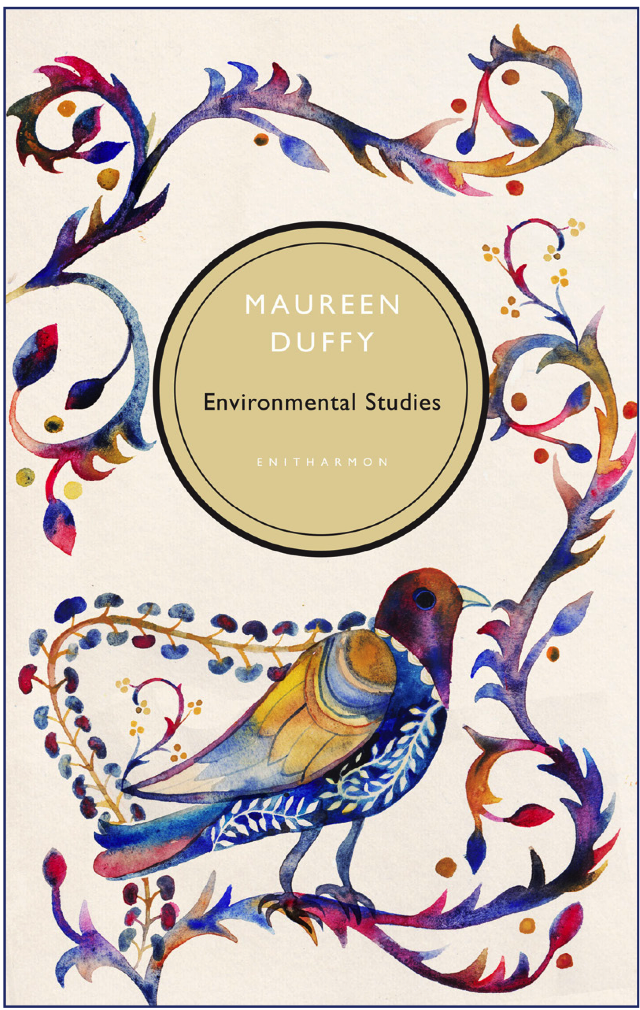 Environmental Studies
Environmental Studies
Maureen's new collection of poems, her seventh, Environmental Studies, was published by Enitharmon on May 6th 2013 and is available from Amazon.
Maureen Duffy’s latest poetry collection is centred on environments – human, insect and animal – some experienced personally, some observed, some imagined. Though strictly contemporary in her concerns, she reaches back in her poetry to childhood, and beyond that in her imagination to cultural figures of the past – John Donne, Edward Elgar, Ralph Vaughan Williams, bringing them lucidly and vividly to life.
There is a strong sense of compassion and fair play in her poems, reflecting Duffy’s lifelong support for progressive social and political movements, and a beautiful lyricism and technical skill derived from her love of the classical world and Old and Mediaeval English. As so often in her work, London past and present provides the backdrop to her real and imagined life stories: of love and loss, forebears and friends, the humorous and sometimes painful experiences of old age.
'Maureen Duffy deserves serious acclaim as a poet, as much as an original novelist.' --Elaine Feinstein, The Times
The Orpheus Trail
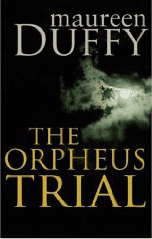 When a child is found dead among the charred remains of a pier fire, surrounded by the old-fashioned toys of the Greek god Dionysus and a ritualistic fire basket, Detective Inspector Hildreth calls in the local museum’s curator, Alex Kish, to help him decipher the mysterious symbolism.
When a child is found dead among the charred remains of a pier fire, surrounded by the old-fashioned toys of the Greek god Dionysus and a ritualistic fire basket, Detective Inspector Hildreth calls in the local museum’s curator, Alex Kish, to help him decipher the mysterious symbolism.
Soon afterwards an ancient Saxon amulet is stolen from the museum and the dead bodies of other young boys begin to turn up arranged as grotesque works of art with components of the gold amulet around their necks. The enigmatic Detective Inspector draws the curator into a strange web of ancient secrets, pagan ritualism, and the illegal trafficking of young boys.
Have the boys been murdered? How have they got there? What is the meaning of the symbols? And most of all who is responsible and why? The Orpheus Trail is a tense thriller where Hildreth and Kish are caught up in a race against time to interpret these ancient codes and clues before death claims another young life.
Publisher: ARCADIA BOOKS
ISBN: 978-1-906413-05-7
Maureen’s agent is:
Jonathan Clowes Ltd, 10 Iron Bridge House, Bridge Approach, London NW1 8BD, Tel: 0207 722 7674
Go to Amazon.co.uk for the availability of the these titles.
